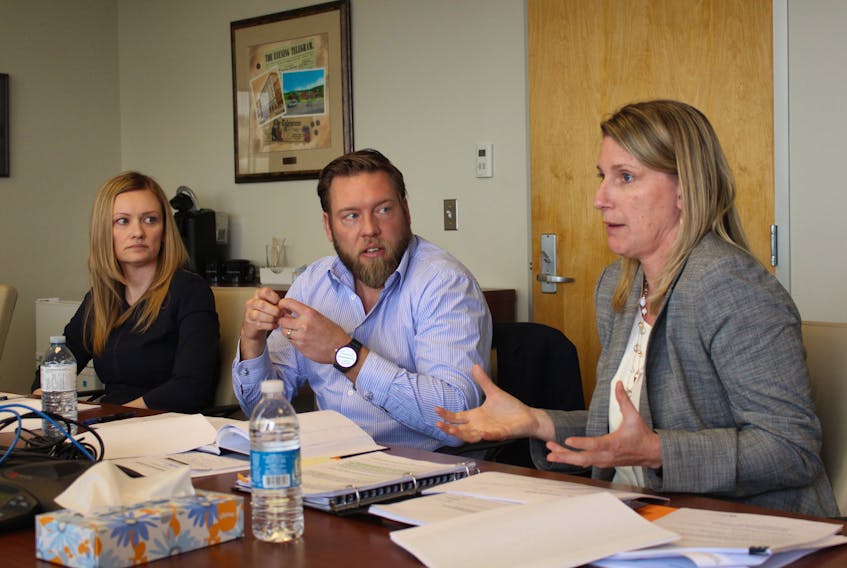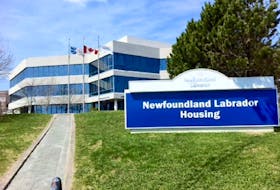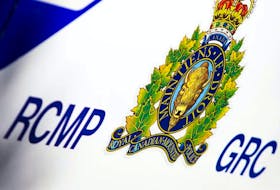It’s a fight personal-injury lawyers in St. John’s say they are certain they are on the right side of — a fight against the possible implementation of a compensation cap on minor injuries sustained in motor vehicle accidents in the province.
A compensation cap is one of the possible solutions put forward to the Public Utilities Board (PUB) in its review of automobile insurance rates in the province, in particular a review of why rates are so high in Newfoundland and Labrador compared to other provinces.
The PUB starts its public hearings phase in St. John’s Tuesday.
On Monday, lawyers Valerie Hynes, Blair Rogers and Kate McGarry of the law firm Roebothan McKay Marshall met with The Telegram’s editorial board to explain their position. The lawyers are also members of the Campaign to Protect Accident Victims.
The lawyers admit some people might think they are looking out for their own self-interest, but they are adamant that someone has to speak out for people who could suffer injuries in the future under an imposed compensation cap.
Hynes said people need to know what a compensation cap would mean to them if they were unfortunate enough to be in an automobile accident and suffer what would be defined under legislation as minor injuries.
“(The people who it would negatively impact) are not even injured yet. How are they going to know?” Hynes said. “They are driving around minding their own business, they are walking down the street, they are attending school, attending bridge, they are not worried about what this (compensation cap) is. We are trying to raise the awareness on this so they can know that this policy will have a dramatic impact on you.
“Personal injury is a massive part of our firm. We would stand to lose, absolutely. But I can absolutely, unapologetically say that I am here because I want the victims to know and for government to understand that this policy will impact them. I will still get to practice law. Those (victims) are not going to get a second chance. If they are injured and their rights are taken away, how are they going to be compensated? Our society will pay for it. They will be less productive. They will not be able to care for their children or their parents. They will not be able to do the things they normally enjoy. They will not be able to exercise the way they want. Our society will ultimately pay.”
Insurance rates for drivers in the province have steadily increased over the approximately 14 years since the last review of the province’s insurance industry. Changes are expected to be introduced in the House of Assembly following the PUB’s review.
In April the PUB announced it had completed its study into the automobile insurance industry and was ready to proceed with the hearings stage. Final submissions to the PUB following the hearings are scheduled for September, with the hope of a final report being completed in October.
The PUB’s mandate for the insurance review included the requirement that it conduct public consultations, as well as do two independent closed claims studies: one on the rising costs of automobile insurance claims, and a second specifically focused on claims related to taxi operators.
The Insurance Bureau of Canada (IBC) and the insurance companies that operate in Newfoundland and Labrador have made three key recommendations to the PUB for changes. They include changes to better facilitate competition to allow more insurers in the province’s market, more stability by implementing measures such as a minor-injury compensation cap and better procedures to improve the health outcomes of collision victims.
The IBC claims there is misinformation about the minor-injury compensation cap being put forth in the public domain that is causing concern, including a rumour that a compensation cap will limit an accident victim’s right to sue. The IBC disputes that, saying victims would still have the right to sue.
Hynes, however, said that means the victim risks having to pay for all the costs of that lawsuit if they lose the case.
“When you’ve taken away the majority of a claim, it makes it very difficult for a client to decide that, ‘I’m going to challenge this,’” Hynes said.
“If the legislation says I am to get $5,000 or $2,500, so I’m now going to take the chance to challenge this legislation and be at risk that I could lose in court. And if you don’t have a large claim to be going after, then you are talking about paying the costs of your lawyer, all the costs of your experts, all the costs of the doctors to all come to court and then to possibly pay the costs of the insurance company that is challenging you on it.”
Hynes said the current system has enough checks and balances in place to protect victims and ensure fair compensation.
“We weigh the evidence, we bear the burden of proving the claim, and therefore you come to the insurance company with all that evidence and they challenge you on it, and you reach a settlement,” she said. “Because, at the end of the day, the way the case law is, it is fair, it is in the range, it is reasonable.”
The lawyers say that the cost of third-party liability — the part of the insurance policy that pays out minor-injury compensation — is not increasing, is not driving up insurance rates.
“What we are seeing here (in the statistics) is that third-party liability is not even keeping up with inflation,” Hynes said. “It is a fairly flat line (over the years). Collision and comprehensive, that portion is exceeding inflation. What is driving property damage — collision and comprehensive — to be climbing at that rate? So we need to take a more thorough look at what is going on because if personal injury, minor accidents were driving rates, why is third-party liability virtually flat?”
The lawyers argue that some of the things the PUB should look at to reduce insurance premiums in the province are the operating costs and profits of the insurance companies.
All a compensation cap will do is save the insurance companies money, they say.









